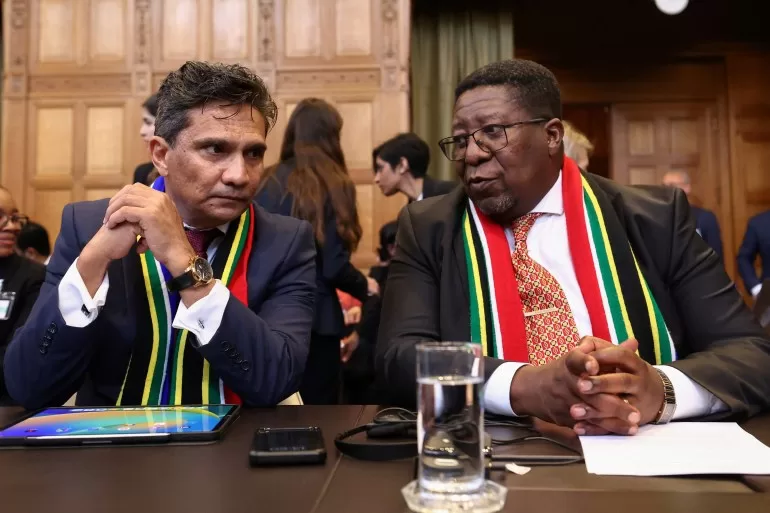Over the last two weeks, Israel has reduced entire neighbourhoods in Rafah to rubble and forcefully displaced hundreds of thousands of people.
Israel says it needs to move into Rafah to complete its mission of defeating Hamas. However, the ICJ ruled that Israel’s war aims effectively violate the rights of Palestinians under the Genocide Convention.
Here’s all you need to know about the ICJ’s new orders.
What was the ICJ ruling on South Africa’s case against Israel?
According to the court, Israel must stop its offensive on Rafah.
The court was not convinced that Israel had taken sufficient measures to protect civilian life and voted – 13 judges to two – that Israel must take effective measures to enable any UN-backed commission of inquiry to enter Gaza and probe genocide allegations.
The court also reaffirmed its previous January 26 ruling that Israel must scale up aid to Palestinians in Gaza.
“The ICJ is essentially saying: OK, enough,” said Alonso Gurmendi, an international law scholar at King’s College, London. “It is a pretty substantial order … it [reflects] a loss of patience [with Israel] in my opinion.”

What was South Africa’s complaint against Israel?
South Africa initially filed an emergency request for Israel to end its offensive on Rafah, but then broadened its request for a full ceasefire in Gaza.
Will this stop Israel’s attack on Rafah?
Minutes after the ruling came in, reports emerged of Israeli air raids in Rafah.
For now, Israel’s Prime Minister Benjamin Netanyahu has not made a formal statement. But analysts believe that Israel will continue to violate the ICJ’s order.
Legal scholars and analysts said Israel refused compliance with earlier ICJ provisional measures on January 26. The ICJ had called on Israel to scale up aid to protect the rights of Palestinians under the genocide convention.
Gurmendi added that the new provisional measure compounds the pressure on Western states that arm Israel.
“How can you justify selling weapons for Israel to use in Rafah? I don’t think you can. I think it is legally impossible,” he said. “So while this [ICJ order] won’t stop the operation in Rafah itself, it builds pressure on the idea that it is OK to just keep selling weapons to Israel.”
What else did the ICJ say?
It ordered Israel to open the Rafah crossing for unhindered provision of aid.
“The order is [legally] binding on Israel. Previous [ICJ] orders [to scale up aid] have already put states on notice that there is an imminent risk of genocide and therefore their duty – under the genocide convention – to prevent that has already been triggered,” said Heidi Matthews, a legal scholar at York University in Toronto.
“Obviously, some folks will be disappointed that there wasn’t a full ceasefire order. This is still a big move, but it’s not a full ceasefire move,” she added.
Any reaction from Palestine or Palestinian groups?
Hamas welcomed the ICJ rulings. It said in a statement that Israel continues to commit massacres in the Gaza Strip. The group added that it expects the court to eventually issue an order for Israel to stop its war on the entire besieged strip.
“What is happening in Jabalia and other governorates of the Strip is no less criminal and dangerous than what is happening in Rafah.”
“We call on the international community and the United Nations to pressure the occupation to immediately comply with this decision and to seriously and genuinely proceed in translating all UN resolutions that force the Zionist occupation army to stop the genocide it has been committing against our people for more than seven months.”
How did Israel respond?
The response from Israeli officials has been largely defiant.
Many officials repeated prior accusations that the court was aiding “terrorists.”
Finance Minister Bezalel Smotrich wrote on X, formerly Twitter, that Israel was in a “war for its existence,” adding that stopping the invasion of Rafah was akin to demanding Israel “cease to exist”.
He warned that stopping the assault meant the “enemy will reach the beds of our children and women throughout the country.” He then tweeted that “history will judge who stood by the Nazis of Hamas and ISIS [ISIL].”
Will the ICJ be able to enforce Friday’s ruling?
They have no enforcement power in the UN system. Enforcement relies on members of the court to uphold their obligations under international law and on the UN Security Council.
How does this court hearing differ from the last one?
Both hearings aimed to secure an end to Israel’s devastating war on Gaza. Experts told Al Jazeera that the ICJ’s new orders intensify pressure on Israel and allied states to protect Palestinians and end its war on Gaza, which has killed more than 35,000 people and made the enclave effectively uninhabitable.

What’s next?
ICJ orders are legally binding. However, the court’s ruling will now be discussed at the UN Security Council, where states can decide to take united action to enforce the court’s orders. Security Council resolutions are also legally binding.
However, the US has a veto, which it has historically used to shield Israel from the consequences of violating international law.
On April 18, the US vetoed a proposed resolution that would have made Palestine the 194th UN member.

You must be logged in to post a comment.